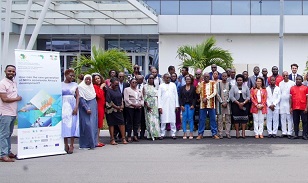
By Edson Baraukwa | Africa Guardian
The 12th Conference on Climate Change and Development in Africa (CCDA-XII) has commenced in Abidjan, gathering a broad coalition of stakeholders to address the pressing climate challenges facing the continent.
Held alongside the special meeting of the African Ministerial Conference on the Environment (AMCEN) in preparation for COP 29 in Baku, CCDA-XII aims to unite leaders, policymakers, experts, and advocates. The conference focuses on exploring innovative solutions, sharing best practices, and forging strategic partnerships to accelerate Africa’s shift towards a low-carbon, climate-resilient future.
In his opening remarks, Côte d’Ivoire’s Minister of Environment, Jacques Assahoré Konan, highlighted the enormity of the climate crisis, stating, “Combating climate change is the greatest challenge humanity has faced in the last century.” He pointed out Africa’s unique vulnerability, noting that the continent contributes less than 4% of global greenhouse gas emissions but suffers disproportionately from climate-related impacts.
“Adaptation to these adverse effects is a major concern for Africa, and securing adequate financing is crucial. The theme of this conference, ‘Financing Climate Adaptation and Resilience in Africa,’ and the expertise gathered here offer a beacon of hope for the continent,” he added.
Hanan Morsy, Deputy Executive Secretary and Chief Economist of the United Nations Economic Commission for Africa (ECA), stressed the urgent need for increased climate finance. “Despite the 2009 pledge of $100 billion annually, only a small portion of the estimated $1.3 trillion required for global climate resilience has been mobilized. The decline in global climate finance for adaptation threatens both the Sustainable Development Goals (SDGs) and existing resilience investments,” she warned.
Morsy called for innovative financing solutions that do not exacerbate Africa’s debt burden, advocating for the use of the African Continental Free Trade Area (AfCFTA) to attract investments in adaptation efforts. She also emphasized the importance of robust public-private partnerships and stakeholder engagement to scale up adaptation investments.
Josefa Correia Sacko, Commissioner for Agriculture, Rural Development, Blue Economy, and Sustainable Environment (ARBE) at the African Union Commission, addressed the substantial financial needs for Africa’s climate goals. “African countries will require approximately USD 3 trillion to fully implement their Nationally Determined Contributions (NDCs) by 2030. Securing adequate financing for climate action remains a significant challenge. That is why we are here today—to discuss key actions and strategies, and to strengthen Africa’s position as we approach COP 29 in November in Baku, Azerbaijan.”
She further stressed the need for a unified approach, saying, “We must speak with one voice as we prepare for COP 29. Our focus should be on mobilizing large-scale climate finance for Africa, prioritizing grants over loans or debt. Financing impactful projects and ensuring that carbon markets benefit us is essential.”
Antony Nyong, Director of Climate Change and Green Growth at the African Development Bank, emphasized the need for recognition and compensation for Africa’s contributions to global mitigation efforts. “Our priority must be fostering climate-resilient development while balancing adaptation with climate-informed investments. This requires adequate financing, technology transfer, and capacity building, in line with the principle of common but differentiated responsibilities,” he stated.
CCDA-XII will address key themes such as climate finance, green growth, climate justice, and regional cooperation. The conference serves as a crucial platform for African leaders, policymakers, and experts to collaborate on strategies that will guide the continent towards a sustainable and resilient future.
As CCDA-XII progresses, it is expected to inspire bold actions and commitments that will tackle Africa’s immediate climate challenges and secure a prosperous and sustainable future for future generations.
The CCDA is held annually in advance of the global Conference of the Parties (COP), organized by ClimDev-Africa—a coalition that includes the African Union Commission, the United Nations Economic Commission for Africa (ECA), and the African Development Bank (AfDB)—in collaboration with the Pan African Climate Justice Alliance (PACJA) and other regional institutions. This year’s conference is hosted by the Government of Côte d’Ivoire from August 30 to September 2, 2024.
___
